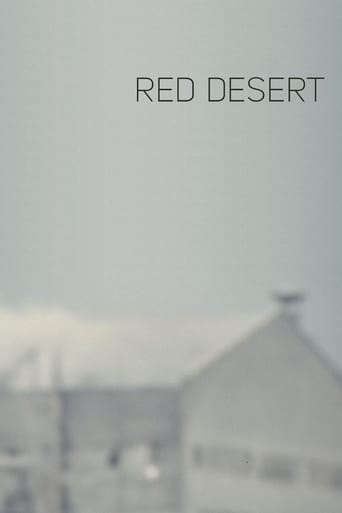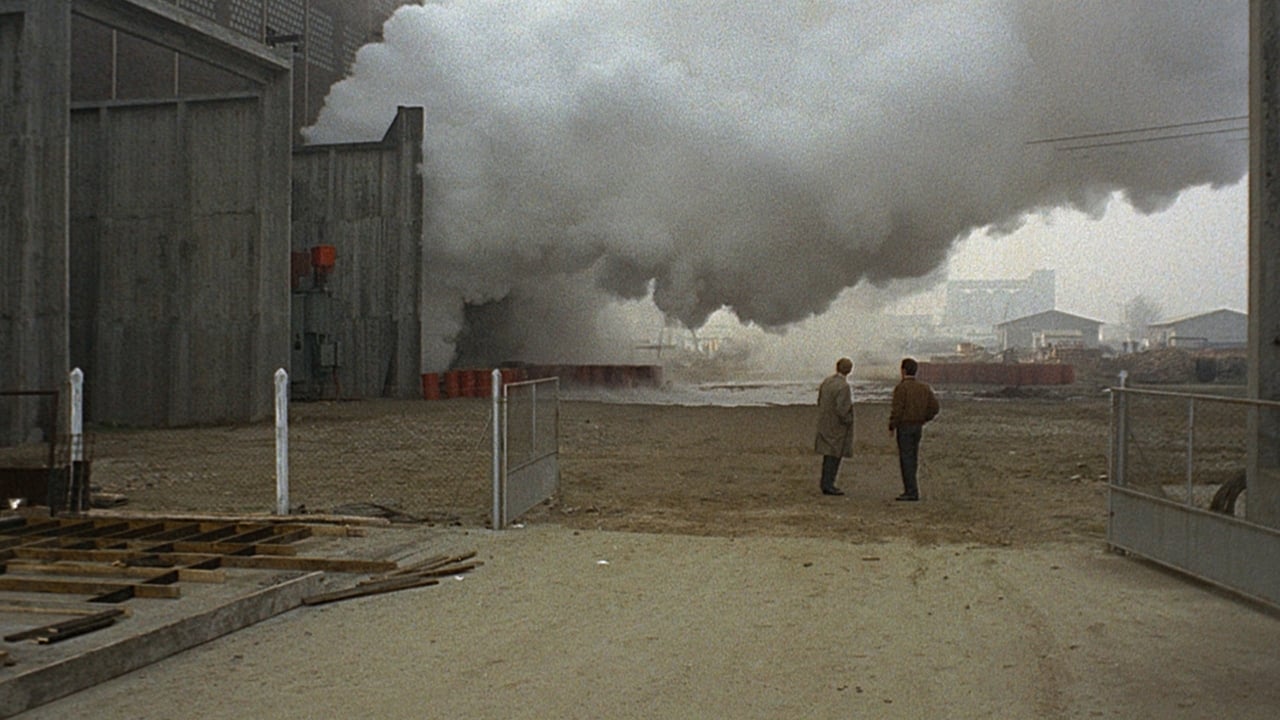elvircorhodzic
RED DESERT is a drama, which brings a magical combination of different colors in a macabre and alienated environment. This is a simple drama about an estranged woman, who is trying to establish a kind of relationship with her environment. A thematic expression of Mr. Antonioni has not undergone significant changes compared to his previous films.Giuliana is walking with her young son around the petrochemical plant managed by her husband. She is very nervous while passing by the workers on strike, and while listening strange sounds from the plant. Her husband talks with his business associate, Corrado, and mentions his wife, who had a car accident, which has brought a certain mental disorders to her. Ugo is unable to understand her impulsive and nervous behavior. Giuliana and Carrado meet each other and she indirectly reveals details about her mental state. A relationship between two alienated people through a laughter, sexual allusions and brutal truth, can begin...Mr. Antonioni has put his focus on the tempo and a relation between action and reaction by his protagonists. He has presented unhappy lives through a sort of contrast between the color and the scenery. The story is enriched with erotic spices, without a sincere love and connections. Sex is a kind of relief in an anxious condition. Well, that makes sense ... to some extent. Mr. Antonioni has probably thought that people, generally, want to watch distraught lives. This is, unfortunately, true, regardless of the knowledge of described problems.Monica Vitti as Giuliana is a distraught woman, who is confined in her own world from which there is no escape. She sees everything as a potential threat, so that, one sexual affair does not bring any relief to her. Ms. Vitti has offered a very good performance. Richard Harris as Corrado is a successful businessman and a man who constantly wander. However, an anxious wife has wandered into his bed.Their relationship is vague, but they may be able to accept themselves after sex. Each goal is futile, if an exit door is locked.
semery56
Antonioni's Red Desert asks us to consider the accommodations and adaptations of the newly successful Italian upper middle class to the changing social, economic and environmental conditions of post-World War II industrialization. More particularly, this important film focuses on the insecurities and honest fears of the middle-aged Giuliana, absorbingly portrayed by Monica Vitti, as she struggles with her own imbalances in the face of a rather sterile marital relationship, shifting social mores and a disturbing and perhaps unhealthy industrial landscape. But the emotionally detached and borderline amoral actions of the supporting players, limited in scope by Antonioni's and Tonino Guerra's script, are also significant to the theme. It is a film that asks how we examine, perceive and choose to act in the world around us each and every day as technology and economic "progress" inexorably make life more complex and disruptive, even as the opportunities for material experiences and goods - for good or ill - increase. Giuliana's mental instability predates the start of the film. A car accident of uncertain causation and her recovery - or lack thereof - in the ensuing hospital stay is unveiled early in the film for context. But Giuliana is clearly not well. She is rightly fearful of the daunting (but geometrically interesting and colorful) industrial structures and the horrifying waste contaminants that are despoiling the land, water and air near the home she shares with industrial manager husband Ugo (Carlo Chionetti) and son Valerio. Ugo, while concerned, appears resolved to maintaining a sort of status quo disequilibrium that he thinks may be manageable. Meanwhile, an industrial entrepreneur, Corrado Zeller (a well-dubbed Richard Harris), acquainted with Ugo, enters the scene, wanting to hire labor for a venture in Patagonia that he is pursuing with half- hearted intensity. He soon begins to shadow Giuliana - and she him - in plain sight during Ugo's workday. These scenes tend to drag a bit as Corrado's undisguised but not physically aggressive pursuit of her reveals a man of surprisingly low self-esteem and an admitted lack of understanding of life. Meanwhile, his interest in her does not assuage her desire for more security and self-awareness in a world she cannot seem to grasp. As their attentions to one another increase - but only slightly, through most of the film - Giuliana's emotional comfort does not progress apace. In fact, the scenes become more dominated by fog and the clouded movement of large, nondescript ships as her connection to a coherent universe continues to slip away. Her confusion is only increased by this strangely kind and attractive figure who, while appearing to empathize with some of her fears, ultimately offers no true solution to her discomfort. In fact, we are left believing that Corrado's actions were more facade than truth, and Antonioni subtly suggests that Giuliana's realization of that fact leads her to a more honest and healthy vision of the odd world she inhabits. One might conclude that she has struggled, and come to an adaptation that might work for her. We are left hopeful.The minor characters in the film, and for purposes of this argument I would include Corrado and Ugo, despite moments of seeming sincerity, are depicted as shallow and accommodative. They are not adapting to the contradictions of modernity, but rather letting their moral principles weaken in the face of the acceptability of money as a standard of righteousness. Antonioni illustrates this through a brilliant scene in a waterfront party shack that is owned by one of Ugo's associates. The flimsy walls are painted in bright colors in this tiny hovel, a metaphor for the shallow excitement and weak moral base that substitutes for honest human companionship in what appears to be a tentatively-engaged bourgeois partner share. Giuliana at least realizes that adaptation to this rapidly changing, increasingly complex and difficultly realized world demands soul-searching and discomforting effort. The others have merely acquiesced to a life devoid of meaning.Antonioni is saying that scientific, technological and most significantly material economic progress, while attractive in some ways - and allegorically represented by the cinematography of Carlo Di Palma, which brilliantly pervades this film - will inexorably present challenges to the human desire to find honest and caring companionship when relationships and a sense of place are fluid., It will push us to come to grips with and ameliorate the destructive aspects of that material progress. A rise in mental instability and addictive or morally suspect behavior may well be a nasty companion to these pressures and challenges. This film, made in 1964, presents a view of modern life that still resonates. View it more than once, and gain more appreciation on each occasion for the power of film to inform our lives.
Nicole C
My film studies professor made us watch this film to understand the essence of the time-image as proposed by Gilles Deleuze. Basically, its a form of cinema wherein the story throughout the film makes not change whatsoever to how it ends. Here, we see Giuliana lost in the world with an unstable mentality and numerous mental breakdowns. At the end, she is still somewhat the same, however there is a minor change mentally, but not outwardly. Hiroshima Mon Amour would also be a perfect example of the time-image as pretty much nothing happens (I was figuratively dying watching that, and died a bit watching this – even the trailer gives multiple mind farts).The acting was awkward, the movements slow and deliberate, and there are lots of times in the film where time just seems to stop. This is intentional, but as a movie buff (of modern times), this does not entertain me.The cinematography was probably the only good thing in this film. Well, maybe some lines were great too. Mainly, everything that was shot (including the colour tinting of scenes) emphasized the inner workings of Giuliana's mind. That she feels like she is alone and doesn't belong anywhere. She clings to the walls when she walks, she sits next to a slanted cart that shows how she is out of balance with the world, and there are shots (mainly one that I can think of) where she is literally out of focus. She is like a red desert, 'red' perhaps alluding to her anxiety of feeling this way, and 'desert' referring to her solitude.Also, I do like the ending because it serves as a metaphor that she's found a way to keep on living with her disoriented mentality. Those ending lines were great. Oh and that one scene in the second half of the film about a story of a girl on an island, though totally random as it is, was interesting.Read more movie reviews at: championangels.wordpress.com
Ted
Red Desert is a beautifully shot film about that ever-modern problem of alienation in the face of progress. Michelangelo Antonioni is as interested in obscuring images as he is capturing them: he periodically drifts his action out of focus, and in one of the film's most masterful scenes, places a dense layer of fog between his principals and his camera, fading them into just barely visible silhouettes. Antonioni also demonstrates a masterful command of color: his stark yellows and reds jump out from his gloomy grey world with all the menace of a poisonous animal. As the film reaches its climax, it becomes increasingly dissonant and disorienting--in all the best ways, of course. Red Desert is a great film; it captures the common angst of modernity with an uncommon mastery of Mise-en-scène and cinematography.


 AD
AD


